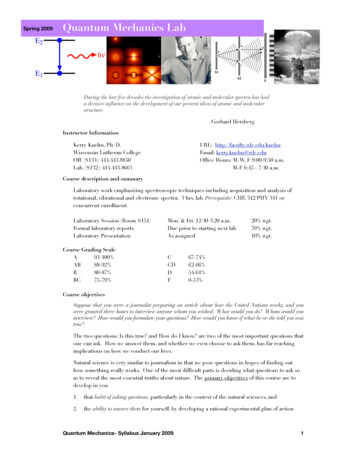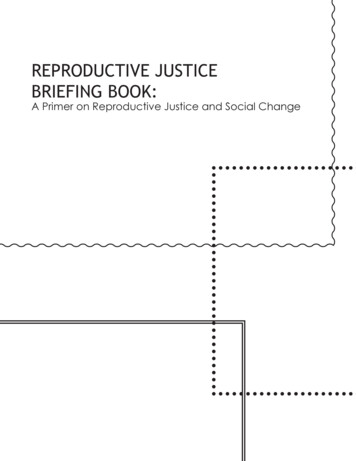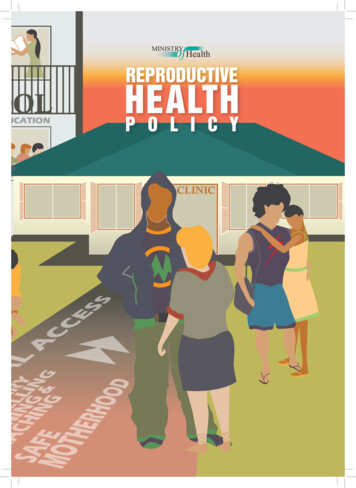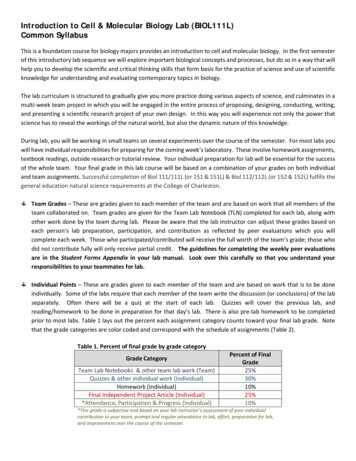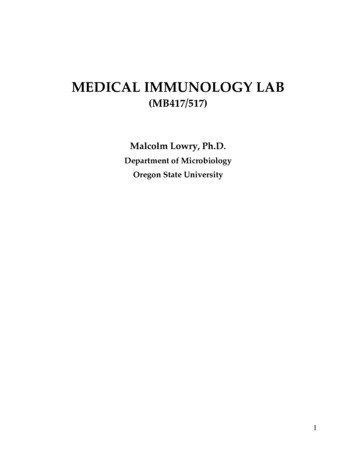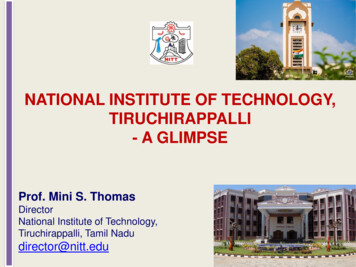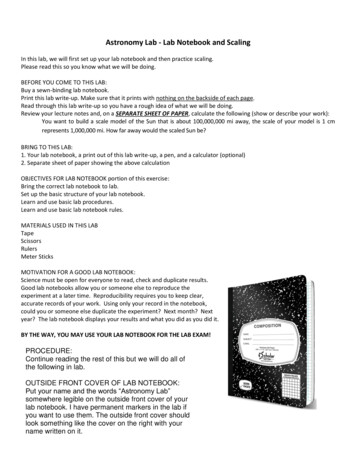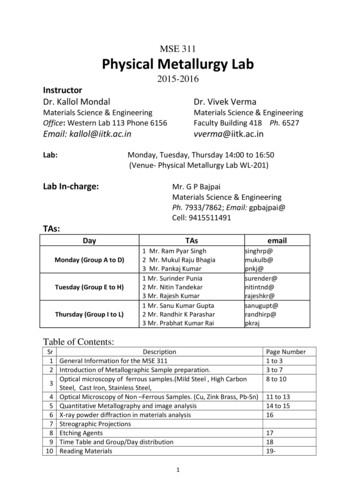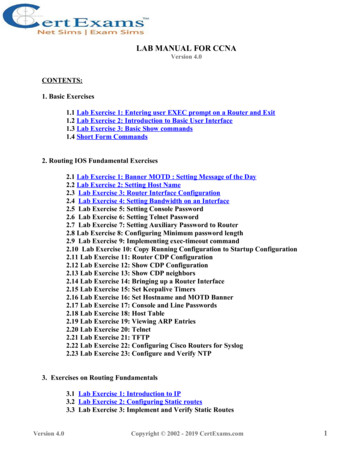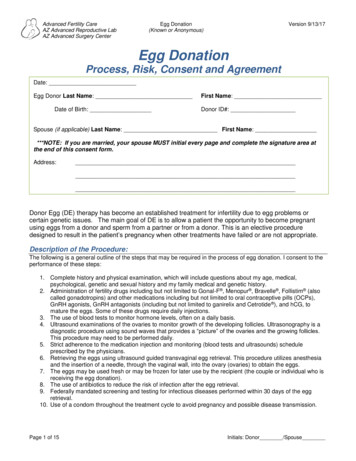
Transcription
Advanced Fertility CareAZ Advanced Reproductive LabAZ Advanced Surgery CenterEgg Donation(Known or Anonymous)Version 9/13/17Egg DonationProcess, Risk, Consent and AgreementDate:Egg Donor Last Name:Date of Birth:First Name:Donor ID#:Spouse (if applicable) Last Name: First Name:***NOTE: If you are married, your spouse MUST initial every page and complete the signature area atthe end of this consent form.Address:Donor Egg (DE) therapy has become an established treatment for infertility due to egg problems orcertain genetic issues. The main goal of DE is to allow a patient the opportunity to become pregnantusing eggs from a donor and sperm from a partner or from a donor. This is an elective proceduredesigned to result in the patient’s pregnancy when other treatments have failed or are not appropriate.Description of the Procedure:The following is a general outline of the steps that may be required in the process of egg donation. I consent to theperformance of these steps:1. Complete history and physical examination, which will include questions about my age, medical,psychological, genetic and sexual history and my family medical and genetic history.2. Administration of fertility drugs including but not limited to Gonal-F , Menopur , Bravelle , Follistim (alsocalled gonadotropins) and other medications including but not limited to oral contraceptive pills (OCPs),GnRH agonists, GnRH antagonists (including but not limited to ganirelix and Cetrotide ), and hCG, tomature the eggs. Some of these drugs require daily injections.3. The use of blood tests to monitor hormone levels, often on a daily basis.4. Ultrasound examinations of the ovaries to monitor growth of the developing follicles. Ultrasonography is adiagnostic procedure using sound waves that provides a “picture” of the ovaries and the growing follicles.This procedure may need to be performed daily.5. Strict adherence to the medication injection and monitoring (blood tests and ultrasounds) scheduleprescribed by the physicians.6. Retrieving the eggs using ultrasound guided transvaginal egg retrieval. This procedure utilizes anesthesiaand the insertion of a needle, through the vaginal wall, into the ovary (ovaries) to obtain the eggs.7. The eggs may be used fresh or may be frozen for later use by the recipient (the couple or individual who isreceiving the egg donation).8. The use of antibiotics to reduce the risk of infection after the egg retrieval.9. Federally mandated screening and testing for infectious diseases performed within 30 days of the eggretrieval.10. Use of a condom throughout the treatment cycle to avoid pregnancy and possible disease transmission.Page 1 of 15Initials: Donor /Spouse
Advanced Fertility CareAZ Advanced Reproductive LabAZ Advanced Surgery CenterEgg Donation(Known or Anonymous)Version 9/13/17Donor’s Responsibilities & Clinical ContractI understand that this section describes the specific responsibilities and requirements to which I have agreed inacting as an egg donor. I understand that I will be compensated for my time and effort only if I meet theseresponsibilities.By signing this agreement, I state again that I have been completely truthful in all the information I have given in myapplication to be an egg donor regarding my age, personal medical, psychological, sexual and genetic history andthat of my family where requested.As part of my continued participation as an egg donor, I agree to: Submit to any urine tests, cervical cultures, blood tests, or physical examinations required.Continue to truthfully disclose aspects of my age, medical, psychological, genetic, sexual and familyhistory.Refrain from smoking.Refrain from use of recreational drugs.Respond to requests for follow-up information in a timely fashion.Keep all scheduled appointments and arrive promptly.Ensure that any person giving injections to me MUST attend the scheduled Injection Training Appointment.Follow all instructions precisely and ask for assistance if I do not understand those instructions.Refrain from any attempt to learn the identity of the recipients.If I tell others that I am an egg donor, I will not share the exact timing of my cycle or the day of my eggretrieval (except with those that live with me and the person that transports me to and from my eggretrieval).I understand that, from the beginning of my drug treatment with GnRH agonist, antagonist or birth control pills, Imust: Refrain from intercourse or if I have intercourse, use a condom to avoid both pregnancy and diseasetransmission. Pregnancy may result from having unprotected vaginal intercourse during the cycle.Avoid high impact and strenuous activities such as running.Take all medications at the prescribed time.Be present for all blood tests and ultrasounds at intervals determined by the physicians, which may be dailyfor several weeks. All of these monitoring appointments must be scheduled before 10 am.Be available for egg retrieval on the day determined by the physicians, on 36 hours’ notice.Make arrangements for a responsible adult to drive me to the Scottsdale office on the day of the retrieval,drive me home after the retrieval, and remain with me for at least 18 hours after the retrieval because Ihave had a surgical procedure requiring that I receive anesthesia and narcotics.Be responsible for the medications given to me for the cycle; if any medications are not used, I will returnthem on the day of the egg retrieval. If these medications are not returned, I understand that I will be heldfinancially responsible for them and billed 3,000.I understand that: As an anonymous or directed known egg donor and patient of Advanced Fertility Care, I will receivemedical care according to the standards set by SART.If acting as an anonymous egg donor, all reasonable efforts will be made to maintain my confidentiality andprotect my identity unless at some time in the future I agree to reveal it.There are or may be laws in the state of Arizona or other applicable states governing the legitimacy andlegal status of children born following the use of donor eggs. It is also possible that laws may be enacted inthe future that would require Advanced Fertility Care to reveal my identity to the recipient couple (individual)Page 2 of 15Initials: Donor /Spouse
Advanced Fertility CareAZ Advanced Reproductive LabAZ Advanced Surgery Center Egg Donation(Known or Anonymous)Version 9/13/17or resulting offspring. If such laws are enacted, Advanced Fertility Care might be required to adhere tothose requirements.Advanced Fertility Care does not offer legal advice on these matters and if I need or want legal advice Imust consult an attorney with expertise in family law related to assisted reproductive technologies.I will be treated with respect and care throughout the process.I understand that: If needed, I will use my personal medical insurance for any medical attention as a result ofmedications/procedures related to the egg donation program with Advanced Fertility Care. This includesany visits needed at another medical facility. I am aware that Advanced Fertility Care will reimburseme for any co-pays, deductible, or coinsurance payments associated with medical treatmentresulting from complications of my egg donation. In order to have my medical expensesreimbursed, it is my responsibility to notify AND be referred by one of the physicians at AdvancedFertility Care to seek medical attention at an outside medical facility.If I do not have my own personal insurance, it is my sole responsibility to inform Advanced Fertility Care inwriting so that medical insurance for egg donation only can be purchased on my behalf. I acknowledgethat this expense of 250.00 will be deducted from my total compensation amount. If I fail to informAdvanced Fertility Care of not having my own personal insurance, I acknowledge that Advanced FertilityCare will NOT be responsible for fees/expenses incurred if I am required to go to a medical facility forcomplications related to my egg donation cycle. If I have been contracted by an outside donor agency orprivately contracted by the recipient(s), this insurance will NOT be provided by Advanced Fertility Care.I am solely responsible for the cost of any additional treatment required that is unrelated to my eggdonation.Treatment will be provided to me by a member of Advanced Fertility Care’s medical team or otherphysician as indicated.I understand that in exchange for the time and effort I expend during this cycle, the Recruiting Program (AFC oroutside donor agency) or the Intended Parent(s) will control my reimbursement.I understand that the reimbursement rules below will apply: My total compensation for the donation of my eggs (oocytes) for each completed, stimulated IVF cycleshall be determined and administered solely and directly through the AFC donor program, outside donoragency or intended parents.I understand that if I do not administer the medications correctly and on time, or if I do not complywith physician instructions including being present at all required appointments, that I mayjeopardize the outcome of the Egg Retrieval and I may be subject to financial penalties or forfeitureof payment.In performing the services, duties and obligations of an egg donor it is understood that the donor andAdvanced Fertility Care, PLLC are acting and performing as an independent contractor with respect to theother and that no relationship of partnership, joint venture or employment is created under this agreement.A complete donation cycle is defined as one where the donor completes the four stages of a donor cycle:screening to become an egg donor, ovulation induction (taking the fertility drugs with required monitoring),egg retrieval (including federally mandated infectious disease testing performed within 30 days of the eggretrieval), and post-retrieval checkup approximately 1-2 weeks after the retrieval at which time I will receivecompensation for the cycle (only if I was selected from the AFC Donor Egg Program).Participation is purely voluntary and refusal to participate or withdraw from the program at any time will notinvolve any penalty from Advanced Fertility Care, PLLC other than loss of compensation amount.My initials below on this page and signature on this document indicate that I haveread this agreement, understand my responsibilities and agree to these conditions ofbeing an Egg Donor. If I request, I will be provided a copy of this agreement.Page 3 of 15Initials: Donor /Spouse
Advanced Fertility CareAZ Advanced Reproductive LabAZ Advanced Surgery CenterEgg Donation(Known or Anonymous)Version 9/13/17Egg Donation ProcessDonor ScreeningPotential egg donors undergo careful screening for genetic, psychological, hormonal and physical screening beforebeing accepted as an egg donor. This screening process involves several office visits over a month or more toassess these factors.Ovarian Stimulation Injections of the natural hormones FSH and/or LH (gonadotropins) are used to cause a groupof eggs to develop to maturity.Additional medications are used to prevent premature ovulation.An overly vigorous ovarian response can occur, or conversely an inadequate response.“Fertility drugs” are used to stimulate the ovary in hopes of inducing the simultaneous growth of several oocytes(eggs) over the span of 8 or more days. Monitoring of your ovaries’ response by ultrasound is important. A typicalpattern of office visits is shown below:Preparatory CycleEggRetrievalOvarian Stimulation CycleOffice visits: This process does not cause you to run out of eggs sooner in the future. The eggs that are induced to grow bythese medications were already ‘linked’ to this cycle and would have been lost anyway had they not been inducedto grow.Medications may include the following (not a complete list): Gonadotropins, or injectable “fertility drugs” (Follistim , Gonal-F , Bravelle , Menopur ): Thesenatural hormones stimulate the ovary in hopes of inducing the simultaneous growth of several oocytes(eggs) over the span of 8 or more days. All injectable fertility drugs have FSH (follicle stimulatinghormone), a hormone that will stimulate the growth of your ovarian follicles (which contain the eggs). Someof them also contain LH (luteinizing hormone) or LH-like activity. LH is a hormone that may work with FSHto increase the production of estrogen and growth of the follicles. Low-dose hCG (human chorionicgonadotropin) can be used in lieu of LH. These medications are given by subcutaneous or intramuscularinjection. Proper dosage of these drugs and the timing of egg recovery require monitoring of the ovarianresponse, usually by way of blood tests and ultrasound examinations during the ovarian stimulation.As with all injectable medications, bruising, redness, swelling, or discomfort can occur at the injectionsite. Rarely, there can be an allergic reaction to these drugs. The intent of giving these medications is tomature multiple follicles, and many women experience some bloating and minor discomfort as the folliclesgrow and the ovaries become temporarily enlarged. Up to 2.0 % of women will develop OvarianHyperstimulation Syndrome (OHSS) [see full discussion of OHSS in the Risks to Women section thatfollows]. Other risks and side effects of gonadotropins include, but are not limited to, fatigue, headaches,weight gain, mood swings, nausea, and clots in blood vessels.Even with pre-treatment attempts to assess response, and even more so with abnormal pre-treatmentevaluations of ovarian reserve, the stimulation may result in very few follicles developing. The end resultPage 4 of 15Initials: Donor /Spouse
Advanced Fertility CareAZ Advanced Reproductive LabAZ Advanced Surgery CenterEgg Donation(Known or Anonymous)Version 9/13/17may be few or no eggs obtained at egg retrieval or even cancellation of the treatment cycle prior to eggretrieval.Concerns have been raised that the risk of ovarian cancer may increase with the use of fertility drugs, butrecent studies have not confirmed this. A major risk factor for ovarian cancer is infertility per se, and earlyreports may have falsely attributed the risk resulting from infertility to the use of medications to overcome it(see 2.b.2 for further discussion). GnRH-agonists (leuprolide acetate) (Lupron ): This medication is taken by injection. There are twoforms of the medication: A short acting medication requiring daily injections and a long-acting preparationlasting for 1-3 months. The primary role of this medication is to prevent a premature LH surge, which couldresult in the release of eggs before they are ready to be retrieved. Since GnRH-agonists initially cause arelease of FSH and LH from the pituitary, they can also be used to start the growth of the follicles or initiatethe final stages of egg maturation. Though leuprolide acetate is an FDA (U.S. Food and DrugAdministration) approved medication, it has not been approved for use in IVF, although it has routinelybeen used in this way for more than 20 years. Potential side effects usually experienced with long-termuse include, but are not limited to: hot flashes, vaginal dryness, bone loss, nausea, vomiting, skin reactionsat the injection site, fluid retention, muscle aches, headaches, and depression. No long term or seriousside effects are known. Since GnRH-a are oftentimes administered after ovulation, it is possible that theywill be taken early in pregnancy. The safest course of action is to use a barrier method of contraception(condoms) the month you will be starting the GnRH-a. GnRH-a has not been associated with any fetalmalformations, however you should discontinue use of the GnRH-a immediately if pregnancy is confirmed. GnRH-antagonists (ganirelix acetate or cetrorelix acetate) (Ganirelix , Cetrotide ): These are anotherclass of medications used to prevent premature ovulation. They tend to be used for short periods of time inthe late stages of ovarian stimulation. The potential side effects include, but are not limited to: abdominalpain, headaches, skin reaction at the injection site, and nausea. Human chorionic gonadotropin (hCG) (Profasi , Novarel , Pregnyl , Ovidrel ): hCG is a naturalhormone used in IVF to induce the eggs to become mature and fertilizable. The timing of this medication iscritical to retrieve mature eggs. Potential side effects include, but are not limited to: breast tenderness,bloating, and pelvic discomfort. Oral contraceptive pills: Some treatment protocols include oral contraceptive pills to be taken for 2 to 4weeks before gonadotropin injections are started in order to suppress hormone production or to schedule acycle. Side effects include unscheduled bleeding, headache, breast tenderness, nausea, swelling and therisk of blood clots or, very rarely, stroke. Other medications: Antibiotics may be given for a short time during the treatment cycle to reduce the riskof infection associated with egg retrieval or embryo transfer. Antibiotic use may be associated with vaginalyeast infection, nausea, vomiting, diarrhea, rashes, sensitivity to the sun, and allergic reactions. Antianxiety medications or muscle relaxants may be recommended prior to the embryo transfer. The mostcommon side effect is drowsiness. Other medications such as steroids, heparin, low molecular weightheparin or aspirin may also be included in the treatment protocol.Page 5 of 15Initials: Donor /Spouse
Advanced Fertility CareAZ Advanced Reproductive LabAZ Advanced Surgery CenterEgg Donation(Known or Anonymous)Version 9/13/17Transvaginal Oocyte (Egg) Retrieval Eggs are removed from the ovary with a needle under ultrasound guidanceAnesthesia is provided to make this comfortableComplications are rareOocyte retrieval is the removal of eggs from the ovary. A transvaginal ultrasound probe is used to visualize theovaries and the egg-containing follicles within the ovaries. A long needle, which can be seen on ultrasound, can beguided into each follicle and the contents aspirated. The aspirated material includes follicular fluid, oocytes (eggs)and granulosa (egg-supporting) cells. Rarely, the ovaries are not accessible by the transvaginal route andlaparoscopy or trans-abdominal retrieval is necessary. These procedures and risks will be discussed with you byyour doctor if applicable. Anesthesia is generally used to reduce, if not eliminate, discomfort. Risks of egg retrievalinclude:Infection: Bacteria normally present in the vagina may be inadvertently transferred into the abdominal cavity bythe needle. These bacteria may cause an infection of the uterus, fallopian tubes, ovaries or other intra-abdominalorgans. The estimated incidence of infection after egg retrieval is less than 0.1%. Treatment of infections couldrequire the use of oral or intravenous antibiotics. Severe infections occasionally require surgery to remove infectedtissue. Infections can have a negative impact on future fertility. Prophylactic antibiotics are sometimes used beforethe egg retrieval procedure to reduce the risk of pelvic or abdominal infection in patients at higher risk of thiscomplication. Despite the use of antibiotics, there is no way to eliminate this risk completely.Bleeding: The needle passes through the vaginal wall and into the ovary to obtain the eggs. Both of thesestructures contain blood vessels. In addition, there are other blood vessels nearby. Small amounts of blood lossare common during egg retrievals. The incidence of major bleeding problems has been estimated to be less than0.1%. Major bleeding may require surgical repair and possibly loss of the ovary. The need for blood transfusion israre. (Although very rare, review of the world experience with IVF indicates that unrecognized bleeding has lead todeath.)Trauma: Despite the use of ultrasound guidance, it is possible to damage other intra-abdominal organs during theegg retrieval. Previous reports in the medical literature have noted damage to the bowel, appendix, bladder,ureters, and ovary. Damage to internal organs may result in the need for additional treatment such as surgery forrepair or removal of the damaged organ. However, the risk of such trauma is very low.Failure: It is possible that the aspiration will fail to obtain any eggs or the eggs may be abnormal or of poor qualityand otherwise fail to produce a viable pregnancy.Page 6 of 15Initials: Donor /Spouse
Advanced Fertility CareAZ Advanced Reproductive LabAZ Advanced Surgery CenterEgg Donation(Known or Anonymous)Version 9/13/17Anesthesia: The use of anesthesia during the egg retrieval can produce unintended complications such as anallergic reaction, low blood pressure, nausea or vomiting and in rare cases, death. Modern anesthesia isrelatively safe and uneventful so that virtually everyone can be afforded its benefits. There are several types ofanesthesia available. Your surgeon has chosen intravenous for your surgical procedure. This anesthesiatechnique is designed to reduce your anxiety and pain. It provides the patient with partial or, in most cases, totalamnesia. Medications (Versed, Fentanyl, and/or Diprovan (i.e. Propofol) are injected into the bloodstreaminducing a semi-conscious state. Most patients will sleep through the procedure, waking up shortly after theprocedure is finished.You will need to fast (not eat or drink anything) for at least 8 hours before the scheduled procedure.Due to the nature of anesthesia, fatigue or sleepiness can be expected for up to 24 to 36 hours after theprocedure, so the patient undergoing anesthesia MUST be accompanied by a responsible adult who can driveher home and care for her for at least 18 hours following the procedure in the event of an emergency. In addition,the patient may not drive during the immediate 18 hours after the procedure.Risks and hazards of intravenous sedation, although rare, can occur regardless of the experience, care and skillof your anesthesia provider. The risks and hazards of intravenous sedation include, but are not limited to: injuryto a blood vessel (phlebitis), vertigo (dizziness), post-operative nausea and vomiting, an unconscious state whichcan lead to depressed breathing, allergic reaction to one of the drugs used (which in extreme cases can lead toanaphylaxis and even death). Your anesthesia provider will do his/her very best to protect you from harm but noguarantee as to the outcome of your anesthesia can be made.Advanced Fertility Care will provide for a licensed physician anesthesiologist to provide intravenous anesthesiafor the surgical procedure. The anesthesiologist administering the intravenous sedation will have full charge ofthe administration and maintenance of the anesthesia, and that it is an independent function from surgery.Your initials at the bottom of the page and signature(s) at the end of this documentindicate your informed consent to receive anesthesia for Egg Retrieval.For the egg donor, the egg retrieval is the last step. In about 2 weeks, your normal period will begin, and by thattime your ovaries will often be back to normal size.Your eggs then become the property of the Recipient (or AFC if the purpose of the cycle is for egg banking), to beused by her or a future Recipient for procreation. Sperm will be placed with your eggs, and one or two of theresulting embryos are transferred into a uterus (either hers or a gestational carrier’s). Extra embryos can be frozenfor later use. In some cases, the recipient is not yet identified at the time your eggs are removed; instead, youreggs can be frozen and stored to be used by someone to have a baby in the future.Situations that could make egg donation impossibleThere are a number of reasons egg donation may not be possible:1. Despite the fact that all instructions are followed faithfully, the ovaries may not respond to the medication,there may not be enough eggs developing, and the cycle may need to be canceled before the egg retrieval.The ovaries may respond too well to the medications and this could lead to a potentially seriouscomplication known as ovarian hyperstimulation syndrome (OHSS) that so the cycle may need to becancelled before the egg retrieval.2. Ovulation (release of the eggs) may occur spontaneously before the eggs can be retrieved.3. In rare cases, no eggs may be retrieved.4. The eggs may not be normal.5. Infectious disease testing performed within 30 days of the retrieval may be positive.Page 7 of 15Initials: Donor /Spouse
Advanced Fertility CareAZ Advanced Reproductive LabAZ Advanced Surgery CenterEgg Donation(Known or Anonymous)Version 9/13/17Risks of Egg DonationThe following are risks and discomforts associated with this procedure:1. Blood drawing and medication injections- mild discomfort and a risk of developing a bruise at the needlesite.2. Fertility drugs and other medications used to stimulate the ovaries may cause:a) Hyperstimulation - The fertility drugs/medications previously described may cause excessiveovarian enlargement (“hyperstimulation”), which may cause discomfort (because more than onefollicle is growing). Hyperstimulation may result in ovarian enlargement requiring therapy includinghospitalization and possible surgery with removal of an ovary.b) Cyst formation- The medications described above may result in large cysts forming on theovaries. In the majority of cases, ovarian cysts induced by fertility drugs/medications disappearspontaneously without requiring any intervention. In very rare instances (less than 1% of cycles)these cysts could result in significant abdominal discomfort that could result in the need forhospitalization for observation purposes. One of these cysts could rupture requiring emergencysurgery to stop the bleeding and could result in a need for blood transfusions and possible loss ofone or both ovaries (this occurs in less than 0.1% of cycles).c) Ovarian Hyperstimulation Syndrome (OHSS)- Fluid shifts within the body may require closeobservation and even hospitalization for further observation and treatment (1%-3% of cycles). Thehigh levels of estrogen associated with the use of these medications may alter the way in which thebody handles fluids. More specifically, the blood vessels may become “leaky” resulting in theaccumulation of fluid within the abdominal cavity (ascites) or around the lungs (pleural effusion).This accumulation of fluid may result in abdominal distension and discomfort with associatedshortness of breath (due to the diaphragm being pushed upward by the accumulation of fluid in theabdomen). In severe cases, removal of this fluid from the abdomen or from the space around thelungs may be required using a small needle (0.5% of cycles). The “leaky” vessels may also result inthe individual becoming dehydrated because the fluid is in the wrong place, i.e. in the abdomeninstead of in the blood vessels. Intravenous fluid administration may be required to maintainadequate blood flow to vital organs such as the kidneys. Severe dehydration could result inirreversible organ failure or blood clot formation leading to a pulmonary embolus (blood clots in thelung) or stroke (less than 0.1% of cycles). There are extremely rare reports in the literature of deathoccurring as a result of complications of OHSS. OHSS is a risk that is inherent to ovulationinduction therapy; prevention cannot be guaranteed. At times, when monitoring shows that therisk of OHSS is unacceptably high, a cycle may be canceled. Severe OHSS will rarely occur if hCGadministration is withheld. Close monitoring of your cycle by the clinic and following its instructionsis imperative to reduce these risks.d) Cancer --Many have worried that the use of fertility drugs could lead to an increased risk ofcancer—in particular, breast, ovarian, and uterine (including endometrial) cancers. One must becareful in interpreting research studies of women taking fertility drugs. Since all of these cancersare more common in women with infertility, simply comparing women taking fertility drugs withwomen in the general population inevitably shows an increased incidence of cancer. When theanalysis takes into account the increased cancer risk due to infertility per se, the evidence does notsupport a relationship between fertility drugs and an increased prevalence of breast or ovariancancer. More research is required to examine the long-term impact fertility drugs may have onbreast and ovarian cancer prevalence rates. For uterine cancer, the numbers are too small to drawconclusions.e) Adnexal Torsion (Ovarian Twisting): Less than 1 percent (1%) of the time, the stimulated ovarycan twist on itself, cutting off its own blood supply. Surgery is required to untwist or even remove it.Page 8 of 15Initials: Donor /Spouse
Advanced Fertility CareAZ Advanced Reproductive LabAZ Advanced Surgery CenterEgg Donation(Known or Anonymous)Version 9/13/173. Egg retrieval has risks including:a) Moderate discomfort after the procedure.b) Possibility of bleeding, infection, or injury to the abdominal organs that may require immediatemajor surgery with possible resulting loss of the uterus and/or ovaries, hospitalization for antibiotictherapy, blood transfusion or, in rare cases, death.c) The egg retrieval requires the use of anesthesia. Risks associated with anesthesia includingnausea, difficulty breathing, respiratory distress or very rarely death.4. The utilization of antibiotics at the time of egg retrieval may result in an allergic reaction, which may resultin a rash. In its most severe form, an allergic reaction may be life threatening. The utilization oftetracycline/doxycycline is associated with an increased sensitivity to the sun and, therefore, caution shouldbe taken to avoid prolonged sun exposure. The utilization of antibiotics may also be associated withnausea, vomiting, diarrhea, loss of appetite and vaginal yeast infections.5. Federally mandated screening and testing for infecti
Advanced Fertility Care Egg Donation Version 9/13/17 AZ Advanced Reproductive Lab (Known or Anonymous) AZ Advanced Surgery Center Page 1 of 15 Initials: Donor_/Spouse_ Egg Donation Process, Risk, Consent and Agreement Donor Egg (DE) therapy has become an established treatment for infertility due to egg problems or
